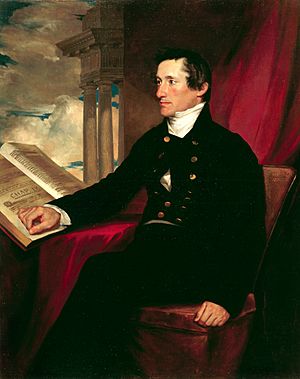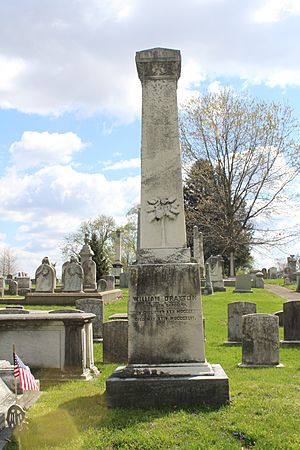William Drayton facts for kids
Quick facts for kids
William Drayton
|
|
|---|---|
 |
|
| Member of the U.S. House of Representatives from South Carolina's 1st district |
|
| In office May 17, 1825 – March 3, 1833 |
|
| Preceded by | Joel R. Poinsett |
| Succeeded by | Henry L. Pinckney |
| Member of the South Carolina House of Representatives from St. Philip's and St. Michael's Parish | |
| In office November 24, 1806 – June 29, 1808 |
|
| Personal details | |
| Born | December 30, 1776 St. Augustine, East Florida |
| Died | May 24, 1846 (aged 69) Philadelphia, Pennsylvania |
| Political party | Jacksonian |
| Profession | banker, planter, politician |
| Military service | |
| Allegiance | |
| Branch/service | |
| Years of service | 1812–1815 |
| Rank | |
| Battles/wars | War of 1812 |
William Drayton (born December 30, 1776 – died May 24, 1846) was an American politician, banker, and writer. He grew up in Charleston, South Carolina. His father, William Drayton Sr., was a judge in the area known as East Florida.
William Drayton served as a representative in the U.S. Congress from 1825 to 1833. After a big political disagreement called the Nullification Crisis, Drayton, who supported the idea of a strong national union, moved his family to Philadelphia, Pennsylvania in 1833. He lived there for the rest of his life.
Early Life and Education
William Drayton was born in St. Augustine, which was then a British colony called East Florida. His father, William Drayton Sr., was the chief judge there. In 1780, his father lost his job because he was thought to be on the side of the American rebels during the American Revolutionary War.
After this, the family moved back to Charleston. William and his older brother, Jacob, were sent to England to finish their schooling. When they returned, both brothers studied law in Charleston and became lawyers.
Family Life
Around 1804, William Drayton married Anna Gadsden. They had four children together:
- Emma Gadsden (born around 1804 – died 1840)
- Thomas Fenwick (1809–1891), who later became a general in the Confederate Army.
- Percival (1812–1865), who became an officer in the U.S. Navy.
- William Sidney (born around 1814–1860), who also became a U.S. Naval officer and a shipping businessman.
After Anna passed away in 1814, William married Maria Heyward in 1817. They had five children, but only two lived to be adults:
- William Heyward, who became a lawyer in Philadelphia.
- Henry Edward, who became a doctor in Philadelphia.
When William Drayton's family moved north to Philadelphia, his son Thomas Drayton, a graduate of West Point, stayed in South Carolina. Thomas bought a large farm called a plantation at Hilton Head. He left the U.S. Army to join the Confederate forces when the Southern states separated from the Union. Interestingly, Thomas and his brother Percival were on opposite sides during the Battle of Port Royal in 1861.
Political Career
William Drayton served in the War of 1812, where he earned the rank of colonel. He used this title for the rest of his life. In 1824, Colonel Drayton was elected to represent South Carolina in the U.S. Congress. He served there from 1825 to 1833, being re-elected several times.
During a time of major political debate called the nullification controversy, Drayton supported the idea of the United States staying united. Because of this, he moved his family to Philadelphia in 1833. Two years later, in 1835, he became a member of the American Philosophical Society, a famous group that promotes knowledge. Even though he supported the Union, Drayton also supported slavery. In Philadelphia, he wrote a book in 1836 called The South Vindicated from the Treason and Fanaticism of the Abolitionists, which argued in favor of slavery. For a short time in 1841, he was the president of the Second Bank of the United States, which was no longer in operation.

William Drayton passed away on May 24, 1846, in Philadelphia. He was buried at Laurel Hill Cemetery.
Legacy and Honors
- His important papers and writings are kept at the Historical Society of Pennsylvania in Philadelphia.
- The famous author Edgar Allan Poe dedicated his book Tales of the Grotesque and Arabesque (published in 1840) to William Drayton.
 | Anna J. Cooper |
 | Mary McLeod Bethune |
 | Lillie Mae Bradford |




